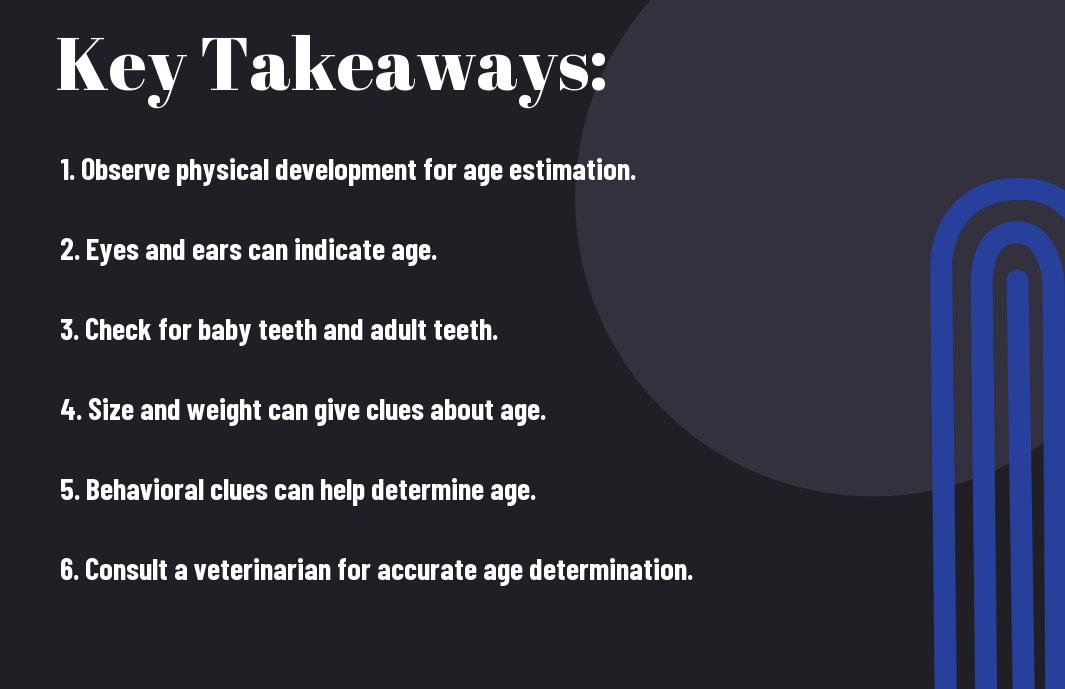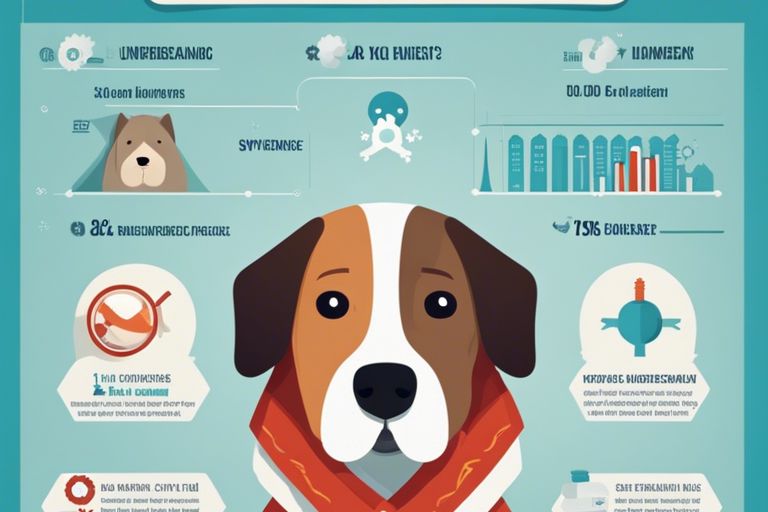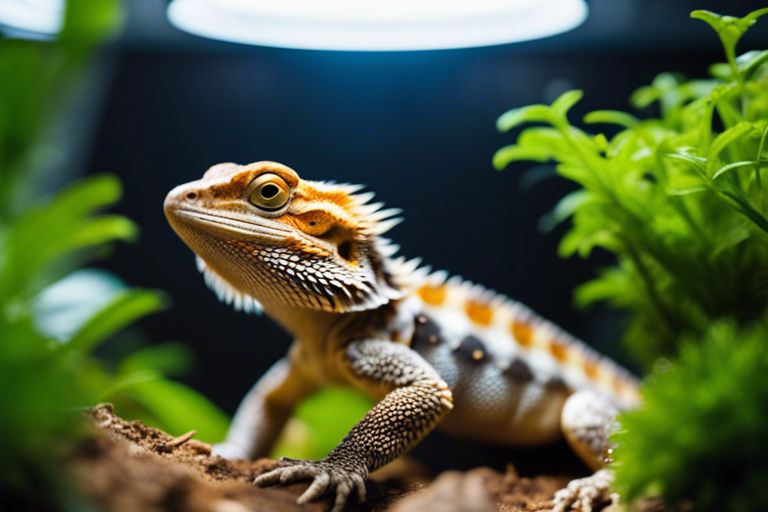Mistaking the age of a kitten can lead to improper care and health issues. As a cat owner, it is crucial to accurately determine the age of your kitten in order to provide the appropriate care and nutrition. In this blog post, I will discuss several key indicators that can help you determine the age of your kitten. By learning how to assess the various milestones and physical characteristics of a growing kitten, you can ensure that you are meeting their unique needs at every stage of development. Whether you are a new cat owner or an experienced enthusiast, understanding how to tell the age of a kitten is an essential skill for providing optimal care and support.
Key Takeaways:
- Weight and size: A kitten’s weight and size can provide clues about its age. Newborn kittens typically weigh 3-4 ounces at birth and then gain 0.5-2 ounces per week.
- Teeth: Checking a kitten’s teeth can help determine its age. For example, a kitten with deciduous, or baby, teeth is typically around 3-4 weeks old.
- Developmental milestones: Monitoring a kitten’s physical and behavioral milestones, such as walking, playing, and grooming, can aid in determining its age.
- Eyes and ears: The appearance and functionality of a kitten’s eyes and ears can also give insight into its age. For example, kittens typically open their eyes at around 7-10 days old.
- Consulting a veterinarian: If in doubt, it’s always best to seek the advice of a veterinarian who can accurately assess a kitten’s age based on various factors and provide appropriate care and guidance.
Determining the Age of a Kitten
By closely observing the physical and behavioral signs of a kitten, you can get a good idea of their age. This is important for their care and development, as different age groups have different needs.
Physical Development
As a kitten grows, their physical appearance changes significantly. In the first few weeks of life, their eyes will be closed, and their ears will be folded down. By 10 days old, their ears will start to open, and their eyes will open fully by 2 weeks old. At around 4 weeks old, a kitten will start to develop their baby teeth, which will be replaced with adult teeth at around 3-4 months of age. Their size and weight will also increase rapidly, with significant weight gain occurring in the first few weeks of life.
Behavioral Indicators
The behavior of a kitten can also provide clues to their age. Young kittens will spend most of their time sleeping and nursing, while older kittens will start to become more active and playful. At around 4 weeks old, they will begin to explore their surroundings and play with toys. Kittens that are weaned will start to eat solid food and use the litter box. Understanding these behavioral changes can help you determine the approximate age of a kitten.

Kitten Care Tips
Now that you have a new kitten in your life, it’s important to provide the best care possible to help them grow into a healthy, happy cat. Here are some essential tips for kitten care to ensure they thrive in their new home:
- Provide a balanced diet with high-quality kitten food, specially formulated to meet their unique nutritional needs.
- Make sure your kitten has access to fresh water at all times to keep them hydrated.
- Keep your kitten active and stimulated with toys and playtime to encourage exercise and mental engagement.
- Give your kitten a safe, comfortable place to sleep and ensure they have plenty of opportunities for rest.
- Schedule regular check-ups with a veterinarian to monitor your kitten‘s health and well-being.
Though kittens are small and adorable, they require attentive care and dedication to ensure they develop into healthy cats.
Nutrition
Proper nutrition is crucial for the growth and development of your kitten. You should feed them high-quality kitten food that is specifically formulated to meet their unique dietary needs. It’s important to follow the feeding guidelines provided on the packaging to ensure your kitten is getting the right amount of food at each stage of their growth. Additionally, be mindful of any potential food allergies or sensitivities your kitten may have, and consult with your veterinarian if you have any concerns about their diet.
Grooming
Regular grooming is essential to keep your kitten clean and healthy. Brushing their fur helps to remove loose hair and prevent matting, while also promoting circulation and reducing the risk of hairballs. Additionally, trimming your kitten‘s nails and cleaning their ears and teeth on a regular basis are important parts of their grooming routine. Starting these habits early will help your kitten become accustomed to grooming and make the process easier as they grow.
Socialization
Socialization is crucial for helping your kitten become a well-adjusted and confident cat. Expose them to a variety of experiences, people, and other animals in a safe and controlled manner to help them feel comfortable in different situations. Encourage positive interactions and provide plenty of opportunities for play and exploration to help your kitten develop essential social skills and build confidence.
Health Considerations for Kittens
However, determining a kitten’s age is not only important for understanding their development and needs, but also for addressing their health considerations. Knowing your kitten’s age can also help you stay on top of their health needs and ensure they receive the appropriate care at the right time. To learn more about how to tell how old a kitten is and why it matters, check out this resource.
Vaccinations and Parasite Prevention
When it comes to the health of your kitten, vaccinations and parasite prevention are crucial for their well-being. Vaccinations protect your kitten from common, potentially deadly diseases such as feline distemper, calicivirus, and herpesvirus. Additionally, parasite prevention is important in safeguarding your kitten from fleas, ticks, and intestinal parasites that can cause serious health issues. It’s essential to consult with your veterinarian to determine the appropriate vaccines and prevention methods based on your kitten’s age and lifestyle.
Veterinary Check-ups
Regular veterinary check-ups play a vital role in ensuring your kitten’s overall health and well-being. Your veterinarian can monitor your kitten’s growth and development, as well as identify any potential health issues early on. During these check-ups, your veterinarian can also provide valuable guidance on nutrition, behavior, and any necessary preventive care. By scheduling routine veterinary visits, you can stay ahead of any health concerns and provide your kitten with the best possible care.

Conclusion
Upon reflecting on the various indicators of a kitten’s age, it is clear that there are several ways to determine the approximate age of a kitten. From examining its teeth and eyes to observing its behavior and physical development, there are reliable methods for estimating a kitten’s age with some degree of accuracy. By being familiar with these signs, you can better understand the needs and developmental stages of your feline companion, allowing you to provide the appropriate care and attention at each stage of its life. Remember to consult with a veterinarian for a professional assessment and guidance on caring for kittens of all ages.
FAQ
Q: How can I determine the age of a kitten?
A: There are various ways to estimate a kitten’s age, including examining their teeth, eyes, and overall development. Consulting a veterinarian is the most accurate method.
Q: At what age do kittens start to develop teeth?
A: Kittens typically start to develop their baby teeth at around 2 to 4 weeks of age.
Q: How can I tell if a kitten is weaned?
A: A weaned kitten will show interest in solid food and should no longer be nursing from their mother. This transition often occurs around 4 to 6 weeks of age.
Q: What signs indicate that a kitten is around 8 weeks old?
A: By around 8 weeks old, kittens usually have their full set of baby teeth and are starting to exhibit more coordinated movements, including the ability to jump and run.
Q: Can a vet accurately determine a kitten’s age?
A: Yes, a veterinarian is trained to assess a kitten’s age based on various indicators such as dental development, physical growth, and overall behavior, providing the most accurate estimate of their age.








Leave a comment